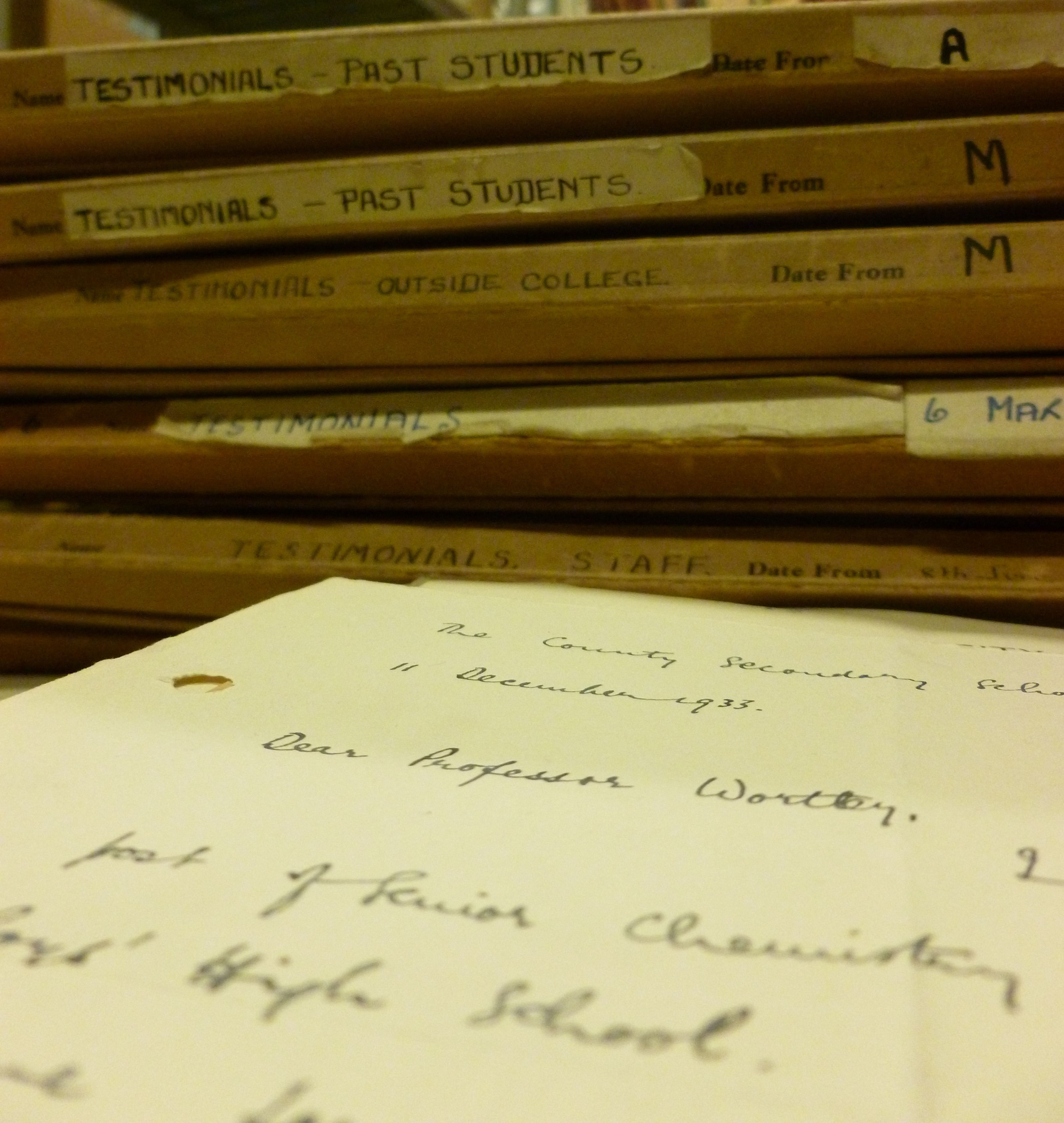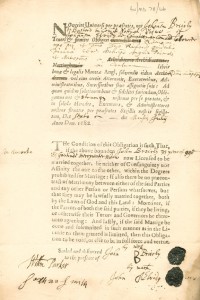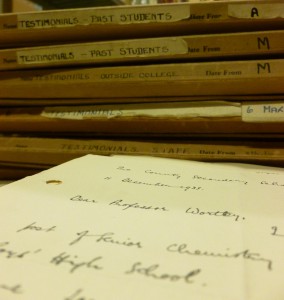
June 2, 2014, by Kathryn Steenson
Finding your Family
Within the 4 million documents held in Manuscripts and Special Collections are the names of hundreds of thousands of people from Nottinghamshire and the broader East Midlands. Catalogues can never list every person named in documents, so one of the major challenges of family history research is finding which records may refer to your ancestors. It’s especially frustrating if only vague details about dates and places are known. To help researchers, we’ve put online some of the name indices our team of dedicated volunteers have created. It’s an ongoing project and we hope to add more on a regular basis. The index contains three main groups of records:
Archdeaconry Court

Marriage bond dated 1682 permitting John Brierly of Basford and Gertrude Merrywether to marry. Ref: AN/MB 78/66
This index has been available on the website for quite some time, and judging from the number of copying requests we get, it’s a popular resource. The Archdeaconry Court dealt with ecclesiastical (not criminal) matters. The index includes the marriage bonds and presentment bills. Marriage bonds are applications for couples wishing to marry by licence. Most marriages took place after banns were published in the parish church on three consecutive weeks. Those marriages won’t appear in the Archdeaconry papers, and you’ll find them in parish registers held by Nottinghamshire Archives. Licences were an option for those couples who didn’t want to (or couldn’t!) wait, and had the money to pay for a licence. Indices to marriage bonds dated 1771-1790 and 1801-1884 are available to search. On the main Archdeaconry search screen, the ‘Names’ search box only searches the groom’s name. Make sure to click on the link for ‘More search options’ in order to search on the bride’s maiden or married name.
Presentment bills are reports from parishes spanning 1587 to 1756, naming people brought before the court for religious or moral offences. Most were either related to non-attendance of church services, or involved sex outside marriage. Attendance at Anglican services was mandatory until the late 17th century, so any Catholic or Nonconformist ancestors may have appeared in court and been fined. Illegitimate children were a potential burden on the parish as well as a cause of moral concern. Usually only the mothers were presented for bastardy. Putative fathers were often named, or presented for fornication, making the bills a useful resource to trace fathers who wouldn’t be named in the baptism registers.
Nonconformist Records
Nonconformist is the general term for non-Anglican Protestant churches e.g. United Reformed, Methodist and Baptist churches. Some nonconformist churches have histories going back to the mid-17th century, when ‘dissenters’ first began to form their own congregations. Extracts from baptism, marriage and burial registers from six nonconformist churches can be browsed. Some have been online for a while, but we have added more entries and made them easier to find. These registers are closed for 100 years.
University College Nottingham Records
Unlike the previous categories, no index to University records has been online before. We’ve started with two series of records: applications for the Elementary Training Department (Teacher Training); and testimonials for former students and staff who requested references. It is more detailed than a name index, but not quite a full transcription. By their nature, applications tend to be lists of qualifications and experience, whereas testimonials give glimpses of people’s personalities, from quiet and bookish to extroverted athletes. The records are closed for 75 years, but please note that for the testimonials this begins from the date of the testimonial, not necessarily when the person studied or worked at UCN.
To search/browse the indices, or find further information about these collections, please visit our Collections in Context pages. A recorded talk about family history resources given by a member of staff is available on the website. If you do find your ancestor within our records, contact us to arrange a visit or request copies (there is a fee for the reprographics service). Manuscripts and Special Collections has between eight and twelve volunteers at any one time, ranging from the family historians, to retired academics, to students hoping to pursue a career in heritage or information management. If you’re interested in volunteering, see our Volunteering page.


J have searched for hours to try to find the details of the marriage of Edward Willoughby & Aletha or Elizabeth Cholmondley and between Francis Willoughby & Mary Slack or Stack Please can you help. I am a Volunteer reserarcher at Baddesley Clinton (NT) whose family is connected to the Willoughby family
Hi Carole, please can you email us the details (including a rough date for the marriages) at mss-library@nottingham.ac.uk and we’ll look into it? Thanks.
Francis Willoughby was born in 1632 so the marriage of his parents Edward & Elizabeth /Alwthea Cholomondley would be c 1830
Francis & Mary Stack (under normal ages of marriages) would have been around 1652…but thats not always the case